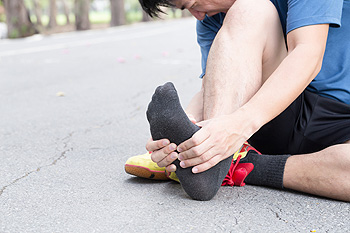(410) 764-7044
6506 Reisterstown Road, Baltimore
1205 York Road, Lutherville
6305 Belair Road, Baltimore
7809 Wise Avenue, Dundalk
Ways to Alleviate Symptoms of Plantar Fasciitis
Monday, 25 March 2019 00:00 Plantar Fasciitis refers to inflammation on the plantar fascia ligament, this ligament connects the heel to the toes. Overuse and strain can cause this condition, which affects the under arch of the foot and causes pain. This inflammation can also cause tension in surrounding muscles, and this can lead to the pain expanding into the calf. Stretches are beneficial in reducing tension, and therefore help to reduce overall pain. Towel curls can be performed by curling a towel with your toes. This stretch is done by placing a towel on the floor then while sitting, place your feet flat on the towel. By grasping the towel with your toes and curling inward you are stretching out the right parts of your foot. Foot flexes are also effective and are performed by sitting on the floor with your legs straight, then after wrapping an elastic band around your feet, begin to point your toes away from your body. If you believe you have plantar fasciitis, then it is highly recommended you speak to a podiatrist to learn about treatment options.
Plantar Fasciitis refers to inflammation on the plantar fascia ligament, this ligament connects the heel to the toes. Overuse and strain can cause this condition, which affects the under arch of the foot and causes pain. This inflammation can also cause tension in surrounding muscles, and this can lead to the pain expanding into the calf. Stretches are beneficial in reducing tension, and therefore help to reduce overall pain. Towel curls can be performed by curling a towel with your toes. This stretch is done by placing a towel on the floor then while sitting, place your feet flat on the towel. By grasping the towel with your toes and curling inward you are stretching out the right parts of your foot. Foot flexes are also effective and are performed by sitting on the floor with your legs straight, then after wrapping an elastic band around your feet, begin to point your toes away from your body. If you believe you have plantar fasciitis, then it is highly recommended you speak to a podiatrist to learn about treatment options.
Plantar fasciitis is a common foot condition that is often caused by a strain injury. If you are experiencing heel pain or symptoms of plantar fasciitis, contact one of our podiatrists from Plaza Podiatry. Our doctors can provide the care you need to keep you pain-free and on your feet.
What Is Plantar Fasciitis?
Plantar fasciitis is one of the most common causes of heel pain. The plantar fascia is a ligament that connects your heel to the front of your foot. When this ligament becomes inflamed, plantar fasciitis is the result. If you have plantar fasciitis you will have a stabbing pain that usually occurs with your first steps in the morning. As the day progresses and you walk around more, this pain will start to disappear, but it will return after long periods of standing or sitting.
What Causes Plantar Fasciitis?
- Excessive running
- Having high arches in your feet
- Other foot issues such as flat feet
- Pregnancy (due to the sudden weight gain)
- Being on your feet very often
There are some risk factors that may make you more likely to develop plantar fasciitis compared to others. The condition most commonly affects adults between the ages of 40 and 60. It also tends to affect people who are obese because the extra pounds result in extra stress being placed on the plantar fascia.
Prevention
- Take good care of your feet – Wear shoes that have good arch support and heel cushioning.
- Maintain a healthy weight
- If you are a runner, alternate running with other sports that won’t cause heel pain
There are a variety of treatment options available for plantar fasciitis along with the pain that accompanies it. Additionally, physical therapy is a very important component in the treatment process. It is important that you meet with your podiatrist to determine which treatment option is best for you.
If you have any questions, please feel free to contact our offices located in Baltimore, Lutherville, and Dundalk, MD . We offer the newest diagnostic and treatment technologies for all your foot care needs.




